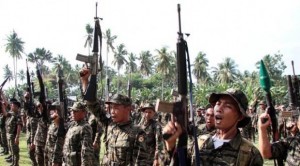MILF disarmament ‘most difficult’ part
COTABATO CITY—The most difficult part of the implementation of the peace process in Mindanao will be the disarming of Moro Islamic Liberation Front (MILF) fighters, the British ambassador to the Philippines said on Friday.
Ambassador Asif Anwar Ahmad told reporters here that disarmament had the longest period in Britain’s peace dealings for the settlement of the conflict in Northern Ireland.
“The DDR (disarmament, decommissioning and reintegration) took us 25 years, at least; but it depends on one’s reckoning; some say [it had been] since the 1920s,” Ahmad said, citing his country’s own experience.
Ahmad said he saw “progressive development” in the peace process, with the draft Bangsamoro Basic Law (BBL) already filed in Congress.
But he said even the process of disarmament would be done in three layers—ceremonial turnover of firearms, decommissioning of the MILF as a separatist organization, and reintegration of its members as they evolve as officials, government workers and as members of the Bangsamoro Security Force (regional police).
Article continues after this advertisementAhmad said “there are many parallels” between his country’s own experience of resolving the Northern Ireland conflict and the Philippines peace settlement formula in the formation of the Bangsamoro government in Muslim Mindanao.
Article continues after this advertisementAhmad said “both parties should adhere to sincerity, trust and confidence and verification [of facts]” in going through the DDR process.
Once decommissioned, the MILF will evolve into a political party. Organizing one is a step toward decommissioning.
The BBL’s requirement for the MILF to organize a political party calls to mind the Good Friday Agreement that also provided for a multiparty pact by most of Northern Ireland’s political parties, the ambassador said.
The Good Friday Agreement signed in Belfast on April 10, 1998, also created peace mechanisms, including linking institutions between Northern Ireland and the Republic of Ireland and between the Republic of Ireland and the United Kingdom.
As a former peace envoy at the UN Security Council, Ahmad said the BBL was a good formula to enhance “balance of powers in a political setting where there is both extreme devolution of powers and extreme centralization of powers in the local government and in the national government.”
Coordinative governance as provided in the draft BBL may require putting in place linking institutions between the Bangsamoro and the central government granting it autonomous powers.
The British ambassador’s job at the UN Security Council brought him to various engagements on peace and security commitments throughout the world.
“There is no part of the world that we think is not important. Our role here is to make sure that tensions don’t arise and that you have good defense capability. This is important [in] helping people when needed. You need transport aircraft and amphibians that can rapidly help people move from one place to another,” he said.
Accompanied by Thomas Phipps, the British Embassy’s second secretary for political and security affairs, Ahmad said he was scheduled to meet with MILF and government leaders, including MILF chair Murad Ebrahim, and local military officials from the 6th Infantry Division under Brig. Gen. Edmundo Pangilinan, and hold a brief dialogue with a few members of the local media. Nash B. Maulana, Inquirer Mindanao
